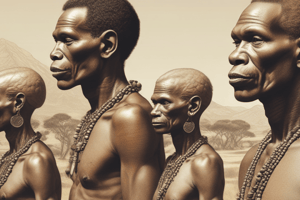Podcast
Questions and Answers
Which hypothesis suggests that humans evolved in Africa and spread out, eliminating other hominid species?
Which hypothesis suggests that humans evolved in Africa and spread out, eliminating other hominid species?
- Evolutionary parallelism
- Out of Africa hypothesis (correct)
- Multiregional hypothesis
- Homo erectus theory
The multiregional hypothesis is currently the most widely accepted theory among scientists regarding human evolution.
The multiregional hypothesis is currently the most widely accepted theory among scientists regarding human evolution.
False (B)
What is the scientific name for the human species?
What is the scientific name for the human species?
Homo sapiens
Humans evolved from more primitive species over millions of years, primarily beginning from __________.
Humans evolved from more primitive species over millions of years, primarily beginning from __________.
Match the following figures with their contributions to human evolution theories:
Match the following figures with their contributions to human evolution theories:
Which hypothesis states that Homo sapiens evolved from a group of Homo erectus in Africa before migrating to other regions?
Which hypothesis states that Homo sapiens evolved from a group of Homo erectus in Africa before migrating to other regions?
The multiregional hypothesis is widely accepted by most of the scientific community today.
The multiregional hypothesis is widely accepted by most of the scientific community today.
What evidence did researchers find in East Africa that supports the Out of Africa theory?
What evidence did researchers find in East Africa that supports the Out of Africa theory?
Mitochondrial DNA is inherited only from a person's _____
Mitochondrial DNA is inherited only from a person's _____
Match the following concepts with their descriptions:
Match the following concepts with their descriptions:
Flashcards are hidden until you start studying
Study Notes
Human Evolution Theories
- Two primary theories explain human evolution: the multiregional hypothesis and the "Out of Africa" hypothesis.
- Human species known as Homo sapiens evolved from earlier species like Homo erectus, which originated in Africa approximately 1.9 million years ago.
Multiregional Hypothesis
- Developed by Milford H. Wolpoff, Alan Thorne, and Xinzhi Wu but has largely fallen out of favor.
- This theory posits that separate populations of Homo erectus evolved into Homo sapiens in various parts of the world, suggesting multiple origins of humanity.
- Fossil evidence outside of Africa indicates intermediate stages between Homo erectus and modern humans, initially supporting this hypothesis.
- Major scientific advancements in DNA analysis contradict the multiregional hypothesis.
- Critics highlight that similarities in fossils could result from parallel evolution due to environmental adaptations, not direct ancestry.
- DNA evidence shows that modern humans interbred with Neanderthals, indicating separate lineages of Homo erectus leading to distinct human groups.
- Genetic differences across people globally could also be attributed to gene flow from migration rather than independent evolution.
"Out of Africa" Hypothesis
- Widely accepted theory suggesting Homo sapiens evolved exclusively in Africa before migrating and replacing other hominid species.
- Gained significant support in the 1990s due to advances in DNA technology.
- Genetic studies revealed East African populations display the highest genetic diversity, implying all modern humans descended from groups that migrated out of this region.
- Mitochondrial DNA analysis traces all living humans to a common ancestor referred to as "Mitochondrial Eve," reinforcing African origins.
- Modern human populations have interbred with Neanderthals and Denisovans, with traces of their DNA found worldwide, indicating complexity in human evolution.
- New evidence suggests that early Homo species might have contributed genetic material to Homo sapiens during their migrations.
Comparative Evidence
- Multiregional hypothesis focuses on fossil records showing gradual evolution across various regions, while "Out of Africa" is supported primarily by genetic diversity and DNA studies.
- The multiregional theory lacks robust fossil evidence, as many fossils are poorly preserved or share traits with other Homo species, complicating claims of independent evolution.
- In contrast, genetic studies consistently show a reduction in diversity with increasing distance from Africa, favoring the "Out of Africa" theory as the more plausible explanation for human evolution.
Conclusion
- Ongoing research and discoveries in both fossil records and genetic analysis continue to shape our understanding of human evolution, indicating that complexity exists in how early humans interrelate and evolve.
- Disagreements among scientists highlight the challenges in categorizing and dating human evolution, influenced by varying interpretations of fossil and genetic evidence.
Studying That Suits You
Use AI to generate personalized quizzes and flashcards to suit your learning preferences.




